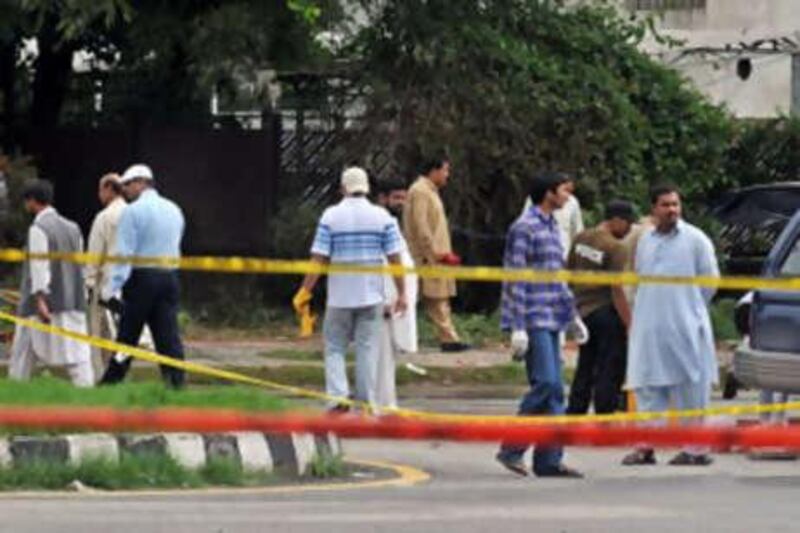ISLAMABAD // Pakistani investigators were sifting through evidence today in the wake of a suicide bombing that killed 19 people near a protest marking the anniversary of a bloody raid on the radical Red Mosque. Police in white jumpsuits made fingertip searches through the night to find clues after yesterday's blast, which targeted a crowd of policemen guarding the rally by thousands in the Pakistani capital.
There was no immediate claim of responsibility but officials said they were examining a range of possible culprits, including the mosque's former students and Taliban militants based near the border with Afghanistan. "At this stage it is too early to say who is behind it," the interior secretary Kamal Shah said. "We have assembled a team of senior policemen and officials from the [government's] Special Investigation Unit and they will meticulously probe this attack," Mr Shah said.
The toll rose overnight to 14 policemen and five civilians, hospital and Islamabad administration officials said. Prime Minister Yousuf Raza Gilani visited injured police officials at one Islamabad hospital before leaving on a visit to Malaysia, while funerals were being held in the capital for the dead. "I pay tribute to the policemen. They did not care for their lives and protected the people attending the convention," Mr Gilani told reporters.
The White House, which counts Pakistan as a key ally in the "war on terror" launched after the September 11 attacks on the United States, denounced the bombing as a "needless act of violence". "We will continue to stand with the people of Pakistan as they face this common enemy," the White House national security spokesman Gordon Johndroe said. Last year's operation against the mosque unleashed a wave of revenge suicide attacks that left around 1,000 people dead and pushed the newly-elected government into entering peace talks with Taliban militants.
Militants said to be loyal to the Red Mosque have been blamed for some of those attacks, especially a number of blasts in Islamabad, although most have been attributed to Pakistani Taliban rebels. Yesterday's demonstration saw religious students from across the country calling for the US-backed president Pervez Musharraf to be publicly hanged for the siege and storming of the radical mosque, in which 100 people were killed.
Pakistani security officials said they were focusing on possible links between the blast and the presence of some members of banned extremist groups, including the al Qa'eda-linked Jaish-e-Mohammed and Sipah-e-Sihaba, at the rally. "We have no firm leads but we are examining the possibility that some of these groups may have been involved or were in league with followers of Lal Masjid (Red Mosque)," a senior security official said on condition of anonymity.
A spokesman for Pakistan's main umbrella organisation of Taliban militants, led by the top commander Baitullah Mehsud, said he was not aware of any of the group's members having claimed responsibility. "I am not in a position to indicate any claim of responsibility, I have not heard from any of our groups," the Taliban spokesman Maulvi Omar said by telephone from an unknown location. The bombing is likely to increase the pressure on the Pakistani government, which has come under fire from the US and other Western allies with troops in Afghanistan over its negotiations with militants.
Pakistani forces launched an operation nine days ago against Islamic radicals near the northwestern city of Peshawar but the government has yet to convince its foreign backers it is serious about combating militancy. *AFP





